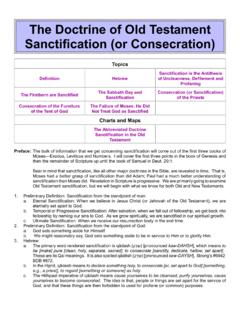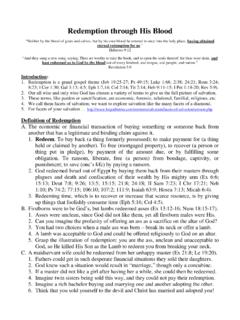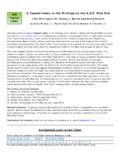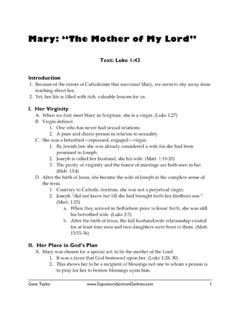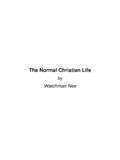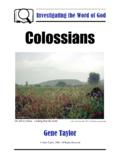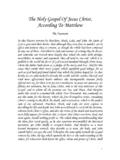Transcription of THE MEANING OF “BORN OF WATER AND THE …
1 DBSJ 4 (Fall 1999): 85 107 THE MEANING OF born OF WATERAND THE spirit IN JOHN 3:5byRobert V. McCabe*he Holy spirit s role in regeneration or the new birth has been thesubject of many theological discussions. A text that has received con-siderable attention is John 3:5, Truly, truly, I say to you, unless one isborn of WATER and the spirit , he cannot enter into the kingdom ofGod. 1 A major interpretative problem with this verse is the MEANING of born of WATER and the spirit (gennhqh/` ejx u{dato" kai; pneuvmato").}
2 Is WATER (u{dato") to be equated with baptism? Should WATER be cor-related with procreation? Or, is WATER used as a symbol for the Word ofGod or cleansing? Furthermore, what is the relationship between wa-ter (u{dato"), and spirit (pneuvmato")? Is WATER set in contrast to thespirit, or do WATER and spirit reflect a conceptual unity?This article will attempt to determine the MEANING of born of waterand the spirit by examining the immediate context of John 3 and otherpertinent theological data. After this, we will survey some of the moredominant and popular interpretations of WATER and the spirit .}}
3 AN EXAMINATION OF JOHN 3:5In the history of Christian interpretation, John 3:5 has often beenassociated with Christian Undoubtedly, the sacramentalismassociated with a broad spectrum of Christianity has influenced some tointerpret this verse in light of a sacramental grid. However, we must de-termine what this verse means in its immediate and overall canonicalcontext. To determine the MEANING of John 3:5, we will initially exam-ine the key concepts within this text, followed by an examination of itsliterary *Dr.
4 McCabe is Professor of Old Testament at Detroit Baptist Theological Semi-nary in Allen Park, Scripture quotations, unless otherwise noted, are taken from the 1977 editionof E. Brown, The Gospel According to John, 2 vols., AB (Garden City, NY:Doubleday, 1966 70), 1 Baptist Seminary JournalAn Examination of Key ConceptsNicodemus is identified in 3:1 as a Pharisee, a ruler of the Jews (a[rcwn tw`n Ioudaivwn). This identification would suggest that he wasnot simply a community leader, but a Jewish leader and perhaps a mem-ber of the After presenting his discussion of the supernaturalorigination of the new birth, Jesus chides Nicodemus in v.]
5 10 for being the teacher of Israel (oJ didavskalo~ tou` Israhvl), yet unable tocomprehend the subject of Jesus discourse, Are you the teacher of Is-rael, and do not understand these things? Two items are significant inv. 10. First, the teacher of Israel is a title reflecting that Nicodemuswas a recognized teacher of Scripture. Second, as a well-known teacher,Nicodemus should have grasped the connection between Jesus doctrineof regeneration and its Old Testament foundation. By the nature of Je-sus berating Nicodemus, this would clearly suggest that Jesus discourseon the new birth is rooted in the Old Testament.
6 Carson has correctlyobserved that nothing could make clearer the fact that Jesus teachingon the new birth was built on the teaching of the Old Testament. 4 Wewill survey four key concepts in 3:5, along with a correlation of eachwith their appropriate Old Testament ofIn a similar manner to the use of Amen in 3:3 and 1:51, Jesusstresses the importance of his teaching by introducing his remarks with adouble Amen. 5 He next sets forth a condition for entering the king-dom of God, viz.
7 , being born of WATER and the spirit . The verbalphrase is comprised of an aorist subjunctive passive verb followed by apreposition, gennhqh/` ejx, is born of. We should initially observe thatJesus use of the passive voice unequivocally stresses that the human par-ticipant in the new birth is completely In addition, we shouldobserve that this specific metaphor of God giving birth to an individ-ual is not used in the Old Testament. It is possible that Jesus drawsupon a common experience of childbearing to illustrate the new K.
8 Barrett, The Gospel According to St. John, 2nd ed. (Philadelphia: Westmin-ster, 1978), p. A. Carson, The Gospel According to John (Grand Rapids: Eerdmans, 1991), F. Bruce, The Gospel of John (Grand Rapids: Eerdmans, 1983), pp. 172, A. Hoekema, Saved by Grace (Grand Rapids: Eerdmans, 1989), p. L. Belleville, born of WATER and spirit : John 3:5, Trinity Journal 1 (Fall1980): 137. born of WATER and the spirit in John 3:587 However, it is equally plausible that the seed form of this specific meta-phor may be seen in those passages where God s covenant relationshipwith Israel is portrayed in a familial relationship.
9 Yahweh is presented asIsrael s Father (Deut 32:6), and the covenant nation as his sons (Deut 8:5; 14:1; Jer 3:19) or first- born (Exod 4:22; Jer 31:9; Hos11:1).8 The relationship between Yahweh and the promised Davidicking is also portrayed in familial terms, Father and son (2 Sam 7:14;1 Chr 17:13; 22:10; 28:6). David is specifically referred to as Yahweh s firstborn (Ps 89:27).9 It is not until the postexilic period that we findpious individual Jews designated as sons of God (Jub 1:23 25; Sir4:10; 23:1, 4; Wis 2:13, 16, 18).
10 10 While familial terms are used of Israeland the Davidic ruler, the concept of God giving birth to individualsis not specifically used in Old Testament thought. However, the familialterms may provide a potential informing background for Jesus use ofgennavw. According to Brown, the familial terms should have providedan informative, though limited, background for the Old Testament context does not provide a completepicture about the new birth, John presents a more complete picture, forhe uses gennavw more often to refer to God s sovereign role in regenera-tion12 than any other writer in the New In Johannine lit-erature, gennavw is used 28 times.
